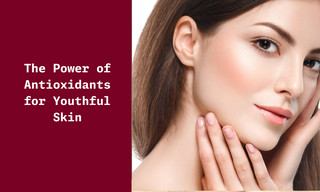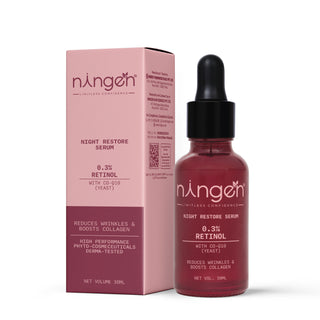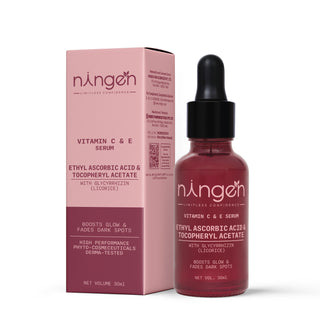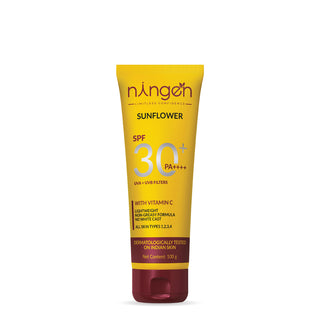Ever wondered how to keep your skin looking fresh and young? Well, you're in the right place.
In this blog, we're going to discuss antioxidants – that do wonders for your skin. Think of them as your skin's defenders against things that make it age faster. We'll keep it simple and down-to-earth as we figure out why antioxidants are like your skin's best buddies, making it stay youthful and radiant. Welcome to our journey into the world of skincare, where we're exploring "The Power of Antioxidants for Youthful Skin".
Ready to dive into the secrets of happy, glowing skin? Let's get started!
What Are Antioxidants?
Antioxidants are like superheroes for your body. They're special nutrients in food that help protect your cells from damage. Imagine them as shields that keep your body safe from things that can make you sick or age faster. Fruits, veggies, and other good foods are packed with these superheroes, and they work together to keep you healthy and feeling good
Based on science, antioxidants are powerful substances that help protect the body from the harmful effects of free radicals. These harmful molecules are produced naturally in the body through normal bodily processes, but they can also be created by factors such as pollution, radiation, and cigarette smoke. Free radicals can cause damage to cells, proteins, and DNA, leading to various health issues such as cancer, heart disease, and aging.
What Antioxidants Do For Skin?
Antioxidants do wonders for the skin! They act like superheroes, protecting your skin from things that can make it look older or tired.
They have become a popular ingredient in skincare products, and for good reason. They offer a wide range of benefits for the skin, helping to combat the damaging effects of free radicals and environmental stressors.
The benefits of antioxidants for the skin are diverse and contribute to a healthier, more radiant complexion:
-
Neutralize Free Radicals: Antioxidants combat free radicals, preventing them from causing damage to skin cells.
-
Reduce Signs of Aging: By fighting oxidative stress, antioxidants help minimize wrinkles, fine lines, and other signs of aging.
-
Enhance Collagen Production: Some antioxidants stimulate collagen synthesis, promoting skin elasticity and firmness.
-
Protect Against Sun Damage: Antioxidants can provide added protection against the harmful effects of UV rays, reducing sun damage.
-
Improve Skin Texture: Regular use of antioxidants can contribute to smoother, more even skin texture.
-
Brighten Skin Tone: Antioxidants help reduce hyperpigmentation, leading to a more even and radiant skin tone.
-
Soothe Irritated Skin: Certain antioxidants have anti-inflammatory properties, making them effective in calming and soothing irritated skin.
-
Hydrate and Moisturize: Some antioxidants contribute to improved skin hydration, helping to maintain a healthy moisture balance.
-
Enhance Skin Repair: Antioxidants support the skin's natural repair process, aiding in the recovery from environmental stressors.
-
Boost Overall Skin Health: Regular incorporation of antioxidants into a skincare routine promotes overall skin health and resilience.
Incorporating antioxidants into your skincare regimen, whether through topical products or a diet rich in antioxidant-rich foods, can contribute to maintaining youthful, glowing skin and protecting it from various external stressors.
When it comes to achieving healthy, glowing skin, incorporating antioxidants into your skincare routine is essential. Here are some of the best antioxidants for skin that you should consider incorporating into your skincare routine.
9 Best Antioxidants for Skin You Need To Add To Your Routine
- Vitamin C is one of the most powerful antioxidants for the skin. It helps to brighten the skin, reduce the appearance of fine lines and wrinkles, and protect against environmental damage. Look for skincare products that contain a stable form of vitamin C, such as ascorbic acid or tetrahexyldecyl ascorbate, to reap the full benefits of this antioxidant.
- Another beneficial antioxidant for skin is vitamin E. It helps to nourish and protect the skin, while also supporting the skin’s natural barrier function. Vitamin E can help to moisturize and soothe the skin, making it an excellent option for those with dry or sensitive skin.
- Green tea extract is another antioxidant that is beneficial for the skin. It is known for its anti-inflammatory properties and can help to calm and soothe irritation. Green tea extract also contains polyphenols, which can help to protect the skin from free radical damage.
- Resveratrol is a powerful antioxidant that is found in grapes and red wine. It is known for its anti-aging properties and can help to reduce the appearance of fine lines and wrinkles, while also protecting the skin from environmental damage.
- Niacinamide, also known as vitamin B3, is a versatile antioxidant that offers a wide range of benefits for the skin. It can help to improve the skin’s texture, reduce the appearance of pores, and even out the skin tone. Niacinamide also has anti-inflammatory properties, making it beneficial for those with acne-prone skin.
- Coenzyme Q10 (CoQ10): A powerful antioxidant that supports collagen production, reducing the signs of aging and promoting skin firmness.
- Astaxanthin: Derived from microalgae, astaxanthin is a potent antioxidant that helps improve skin elasticity and reduce the appearance of fine lines.
- Selenium: A trace mineral with antioxidant properties, selenium supports the skin's defense against UV damage and promotes overall skin health.
- Zinc: While known for its role in immune function, zinc also has antioxidant properties that contribute to skin health and wound healing.
Incorporating these antioxidants into your skincare routine can help to protect and nourish your skin, while also providing anti-aging benefits. Look for skincare products that contain these antioxidants to ensure that you are getting the best possible protection for your skin.
Note: Click on this link to know more about how to prevent skin-aging.
Get Flawless Face with Antioxidants
In today's world, looking and feeling your best is more important than ever. With social media and a society that puts a premium on appearance, the pressure to have flawless skin can be overwhelming. However, the key to achieving that perfect complexion may be simpler than you think. Antioxidants, found in many fruits and vegetables, have been hailed as a game-changer for maintaining youthful and healthy skin.
One of the most common factors that lead to skin damage is exposure to free radicals, which can come from pollution, UV rays, and even stress. These free radicals can wreak havoc on your skin, causing it to age prematurely and leading to dullness, wrinkles, and even skin cancer.
This is where antioxidants come in. They work to neutralize these free radicals, thus protecting the skin from their damaging effects.
But how exactly do antioxidants benefit your skin? Firstly, they can help to reduce inflammation, which is a common cause of various skin conditions such as acne, eczema, and rosacea. By calming the skin and reducing redness, antioxidants can help to improve overall skin tone and texture. They also promote collagen production, which is crucial for maintaining the skin's elasticity and firmness.
In addition, antioxidants can also brighten the skin and give it a healthy glow. By counteracting the effects of environmental damage, antioxidants help to maintain a more youthful and radiant complexion. They can even help to combat hyperpigmentation and sunspots, which are common signs of sun damage.
So, how can you ensure you're getting enough antioxidants for your skin?
Eat a diet rich in fruits and vegetables. Colorful options such as berries, spinach, and sweet potatoes are all powerful sources of antioxidants.
You can also incorporate antioxidant-rich skincare products into your daily routine, such as serums and moisturizers containing Vitamins C and E.
What Are Free Radicals and Why Are They Bad for The Skin?
Free radicals, highly reactive molecules formed during normal body processes and from environmental sources like UV radiation and pollution, pose a threat to the skin. They can damage DNA, proteins, and lipids, contributing to premature aging, wrinkles, and an elevated risk of skin cancer. Additionally, free radicals worsen skin conditions like acne and eczema.
These molecules disrupt skin cell functions, leading to collagen and elastin breakdown, causing sagging and wrinkles. Free radicals also promote inflammation, resulting in redness, irritation, and compromised skin barrier function. This makes the skin more susceptible to sensitivity, dryness, and infections.
To counteract free radical damage, incorporating antioxidants into your skincare routine is crucial. Antioxidants like vitamin C, vitamin E, green tea extract, and niacinamide neutralize free radicals, shielding the skin from their harmful effects. Protect your skin by using antioxidant-rich products and minimizing exposure to factors that generate free radicals.
Protect Your Skin from Free Radical Damage Using Antioxidants
Our skin faces constant assaults from environmental factors, with free radicals being a major culprit. These reactive molecules cause oxidative stress, breaking down collagen and elastin and leading to wrinkles and sagging. To shield our skin, incorporating antioxidants into our skincare routine is crucial.
Antioxidants, like vitamin C, vitamin E, and coenzyme Q10, neutralize free radicals, countering the effects of pollution and UV radiation. These powerhouse ingredients not only fight free radicals but also brighten the skin and promote a youthful appearance.
Using antioxidant-rich products, such as a morning vitamin C serum and an evening coenzyme Q10 night cream, can protect and rejuvenate the skin. It's equally vital to consume antioxidants through a diet rich in fruits and vegetables like berries, leafy greens, and nuts.
In essence, safeguarding your skin from free radical damage is vital for a healthy, youthful complexion. Antioxidants, whether applied topically or ingested through a nutritious diet, act as a formidable defense against environmental stressors, ensuring your skin remains radiant and resilient.
How Do You Choose The Right Antioxidant For Your Skin Concern?
When it comes to caring for your skin, antioxidants are key players in maintaining a healthy and youthful complexion. With so many antioxidant products on the market, it can be overwhelming to choose the right one for your specific skin concerns. Here are some tips on how to choose the right antioxidant for your skin concern.
- First, it’s important to understand your specific skin concerns. Do you have sun damage, fine lines, and wrinkles, or are you dealing with hyperpigmentation? Identifying your skin concerns will help you narrow down the best antioxidant for your needs.
- Once you know your skin concerns, it’s time to look for antioxidants that target those specific issues. For example, if you’re dealing with sun damage, look for antioxidants like vitamin C, green tea extract, or resveratrol, which can help repair and protect the skin from UV damage. On the other hand, if you’re concerned about fine lines and wrinkles, antioxidants like retinol, coenzyme Q10, or niacinamide can help to improve the appearance of aging skin.
- It’s also important to consider the form of the antioxidant. Some antioxidants work best in serums, while others may be more effective in creams or oils. Consider your skin type and preferences when choosing the right form of antioxidant for your routine.
- Lastly, always make sure to look for products with high-quality, stable antioxidants. Look for products that are backed by scientific research and contain high concentrations of antioxidants to ensure effectiveness.
Remember to always consult with a skincare professional if you have any questions or concerns about incorporating antioxidants into your routine.
Note: Know about anti-aging serums that can take your skin to the next level. Click on the link..
Diet and antioxidants
Numerous foods are rich in antioxidants, providing a range of health benefits, including skin health. Here are some antioxidant-rich foods:
-
Berries:
- Blueberries
- Strawberries
- Raspberries
- Blackberries
-
Citrus Fruits:
- Oranges
- Grapefruits
- Lemons
- Limes
-
Leafy Greens:
- Spinach
- Kale
- Swiss chard
- Collard greens
-
Nuts and Seeds:
- Almonds
- Walnuts
- Sunflower seeds
- Chia seeds
-
Vegetables:
- Broccoli
- Carrots
- Bell peppers
- Sweet potatoes
-
Herbs and Spices:
- Cinnamon
- Turmeric
- Ginger
- Oregano
-
Tea:
- Green tea
- Black tea
- White tea
-
Fruits:
- Apples
- Grapes
- Cherries
- Kiwi
-
Whole Grains:
- Quinoa
- Brown rice
- Oats
-
Beans and Legumes:
- Kidney beans
- Black beans
- Lentils
-
Dark Chocolate:
- Choose chocolate with a high cocoa content for antioxidant benefits.
-
Tomatoes:
- Rich in the antioxidant lycopene.
-
Fish:
- Fatty fish like salmon and trout contain astaxanthin, a potent antioxidant.
-
Pomegranates:
- Packed with antioxidants, particularly punicalagin and anthocyanins.
-
Red Wine:
- In moderation, red wine contains resveratrol, a powerful antioxidant.
Incorporating a variety of these foods into your diet can provide a broad spectrum of antioxidants, contributing to overall health and well-being.
Conclusion
"The Power of Antioxidants for Youthful Skin" unveils the transformative impact of these superheroes on our skin's journey. Antioxidants, our trusty defenders against free radicals, have proven to be more than just skincare allies—they are the key to unlocking timeless beauty.
As we embrace the journey towards ageless beauty, let the wisdom of antioxidants be our guiding light. We look forward to a future where skin continues to glow, defying the passage of time - a testament to the enduring power of antioxidants.
Discover our thoughtfully curated collection of skincare products crafted with antioxidants. Explore the carefully chosen items featured in the dedicated section below.
Frequently Asked Questions(FAQ'S)
Question 1: What are antioxidants, and how do they benefit the skin?
Answer: Antioxidants are compounds that protect the skin by neutralizing free radicals, preventing damage and promoting skin health.
Question 2: Which antioxidants are most beneficial for the skin?
Answer: Vitamin C, vitamin E, coenzyme Q10, green tea extract, and resveratrol are powerful antioxidants known for their skin benefits.
Question 3: How do free radicals impact the skin, and why are antioxidants important in combating them?
Answer: Free radicals cause oxidative stress, leading to skin damage and aging. Antioxidants neutralize free radicals, preventing their harmful effects.
Question 4: Can antioxidants help with specific skin concerns, such as wrinkles and hyperpigmentation?
Answer: Yes, antioxidants like vitamin C can help reduce wrinkles, while others like niacinamide can address hyperpigmentation and improve skin texture.
Question 5: How should antioxidants be incorporated into a skincare routine
Answer: Antioxidants can be applied topically through serums, creams, and moisturizers. They can also be included in the diet through antioxidant-rich foods.
Question 6: Are there any potential side effects of using antioxidant-rich skincare products?
Answer: While rare, some individuals may experience sensitivity. It's advisable to perform a patch test and introduce products gradually.
Question 7: Can antioxidants protect the skin from sun damage?
Answer: Antioxidants, particularly vitamin C and E, can offer additional protection against UV rays and minimize sun damage.
Question 8: Are there specific antioxidants suitable for different skin types, such as oily or sensitive skin?
Answer: Niacinamide is well-tolerated for various skin types, while individuals with sensitive skin may benefit from soothing antioxidants like green tea extract.
Question 9: Can antioxidants be used alongside other skincare ingredients, such as retinol or hyaluronic acid?
Answer: Yes, antioxidants can be combined with other ingredients, offering a comprehensive approach to skincare. Layering should be based on product consistency.
Question 10: Are there dietary considerations for enhancing the effects of topical antioxidants?
Answer: Consuming a balanced diet rich in fruits, vegetables, and nuts complements topical antioxidant use, contributing to overall skin health.










